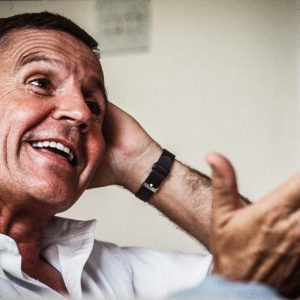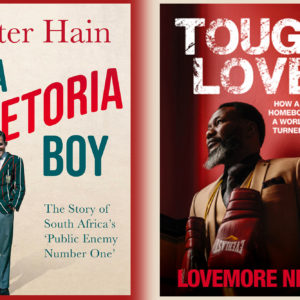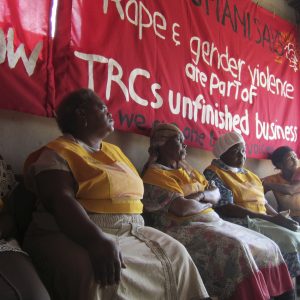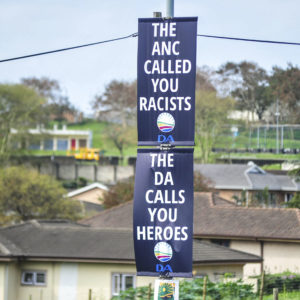Why South Africans cannot forgive FW de Klerk
It took the man he was to bring white public opinion and the security forces to the negotiation table, but his apology for apartheid was too little, too late.
Author:
12 November 2021
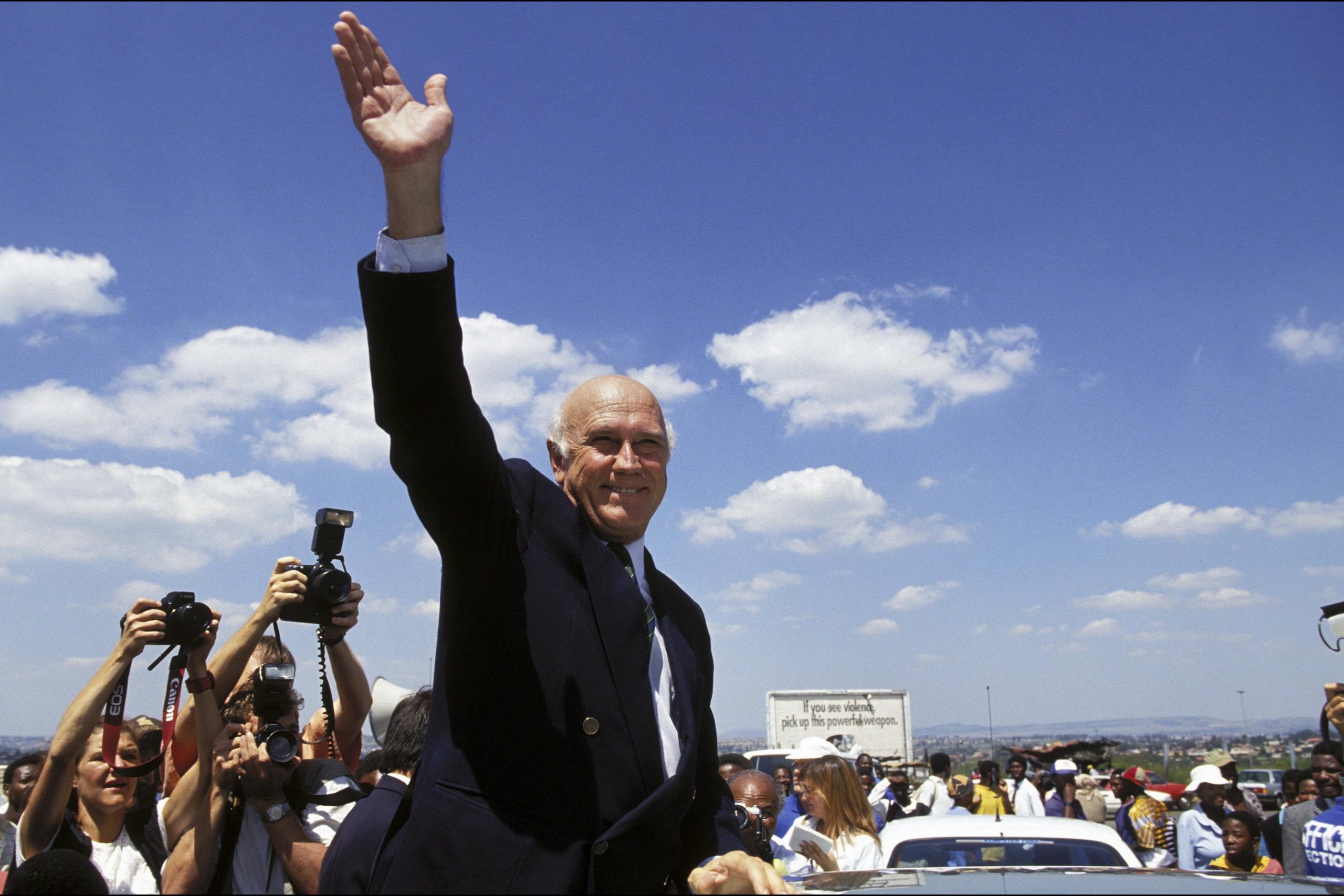
Whoever you are and whatever your life’s experience has been, you have to have a heart of stone not to feel even the slightest tinge of sympathy when you watch FW de Klerk’s farewell video recorded days before his death.
His physical fragility, his absolute desperation to be absolved and be forgiven by his fellow citizens as he prepared to depart this life reminded me that he wasn’t only a former apartheid president, but also just a human being.
I wrote these two paragraphs in the hours after his death. I read it to an old friend of mine, a veteran Black struggle activist, and asked her: Can you relate to this? Did De Klerk’s last message touch you in any way? Is this my whiteness intruding?
Her answer was: No, no, and yes. And she smiled sweetly as if to say: I know. It’s okay, I don’t suddenly think you’re a bad guy. You can’t help it that you were born white.
Several media outlets canvassed my opinion after De Klerk’s death. I’m a white Afrikaner in my later decades, after all, and I was a “struggle journalist” during the turbulent 1980s and early 1990s who had several public run-ins with De Klerk.
As someone who had waged my own little war against De Klerk and his ilk over many years, it would have been easy for me to simply join the chorus of blanket condemnation and express my repulsion at the man and everything he represented; to echo the reaction of a colleague when I told him of De Klerk’s demise: God slaap nie (God doesn’t sleep). De Klerk and I had a long relationship of mutual contempt, and I paid a price for it.
But he is dead now. As a witness to his life and times, I would rather try to be more subtle and measured.
The defining years
If De Klerk had died before 15 August 1989, few would have taken notice of it and only the Afrikaans newspapers would have said something polite about his life. He was a mediocre, narrow-minded Afrikaner nationalist, Calvinist fundamentalist and apartheid ideologue.
It was the following four years of his life that turned him into a national and international figure, the only reason we’re talking about him now.
It was in August 1989 that he replaced PW Botha as leader of the National Party (NP) and state president of apartheid South Africa. He inherited a mess: an economy on the brink of collapse, mass protests that brought the country to the brink of ungovernability, wars on the borders and almost total international isolation.
It was a big moment and De Klerk knew he had serious decisions to make. He was besieged by his older brother Willem, an influential reformist academic, by white business leaders and by the three Western leaders who were soft on the apartheid regime – Margaret Thatcher of Britain, Helmut Kohl of Germany and George HW Bush of the United States – to take bold steps to save South Africa from collapse.
Related article:
Less than three months into his presidency, on 9 November 1989, the Berlin Wall fell. The fear, insofar as it was real in their own minds, of international communism ensconcing itself on the southern tip of Africa through its proxies, the ANC and the SACP, evaporated.
When he took over from Botha, De Klerk was informed by his intelligence chief, Niel Barnard, and his minister of justice, Kobie Coetsee, that they had had long meetings over several years with Nelson Mandela in jail and the assessment was that he wasn’t a violent communist terrorist who would punish whites and take all their wealth.
De Klerk announced his decision in Parliament on 2 February 1990: the unbanning of liberation movements, the scrapping of the state of emergency, and the release of Mandela and other political prisoners.
Stuck to his guns
Oh, he had no other choice, some said then and most still say. It is clear from many interviews he gave afterwards that he wanted to “prevent a Syria”, that he wanted to secure a peaceful and prosperous future for future white generations. With Mandela as leader of Black South Africa and with the support of the powerful Western nations, the risks were low enough.
But Saddam Hussein of Iraq, Bashar al-Assad of Syria and the military junta of Myanmar are examples of contemporary heads of state who faced similar dire consequences and still decided to persist with a military option.
De Klerk’s own military and police generals and many in his party advised him to use his powerful armed forces and security establishment as a tool to slow down the reform process, to draw it out over years, to prolong “talks about talks” until the ANC weakened and collapsed. To his credit, he did not follow this advice.
Related article:
It was what De Klerk did during the three years after his unbanning that gives him, in my view, a positive place in history and makes the strongest argument why he was possibly worthy of a Nobel Peace Prize with Mandela.
He was despised by his own primary constituency, conservative Afrikaners, and by many in his church for signing the death warrant of apartheid as state ideology. His generals were deeply unhappy – a former South African Defence Force chief, Constand Viljoen, actually mobilised thousands of trained soldiers and former conscripts countrywide to resist a “handover” to the ANC.
But De Klerk stuck to his guns and criss-crossed the country, convincing and reassuring white citizens, the business and faith communities, and branches of the secret Afrikaner Broederbond that negotiations for a post-apartheid democracy were in their best interest. He had many tense meetings with senior officers. He even risked the end of his political career and called a referendum among whites to declare whether they were for or against a negotiated settlement.
In other words, he delivered white public opinion and the security forces to the negotiated settlement that culminated in 1994. If he hadn’t, South Africa would have gone down a much bloodier road.
No examination of De Klerk’s life is complete, though, without a mention of what happened in KwaZulu-Natal and some Gauteng townships during his presidency, right up to 1994: the Third Force activities of his security forces that stirred on violent conflict that cost many thousands of lives.
Blighting his reputation
I never thought that De Klerk had what eventually transpired in 1994 in mind when he made his 1990 announcement. He tried several absurd tricks, like a white minority veto and a revolving presidency, but in the end delivered his party to agree to the interim Constitution that formed the basis of our 1996 Constitution.
I was reminded yesterday of Mandela’s words in a televised town hall meeting in New York with interviewer Ted Koppel in July 1990. He was asking why De Klerk was getting credit for simply rectifying his and his party’s own mistakes. Apartheid and its atrocities should never have happened in the first place; Mandela and his comrades should never have been in jail.
Of course Mandela was entirely correct. Over the years, De Klerk angered me and most other South Africans with his claim that he ended apartheid and freed Mandela, without acknowledging that he was an integral part of the system responsible for the evil.
Related article:
Still, apartheid South Africa was powerful and militarised Afrikaner nationalism was formidable. Someone had to dismantle that. It took De Klerk to do it.
De Klerk became, with Thabo Mbeki, a vice-president of the government of national unity under president Mandela in 1994. But he didn’t last. Within two years he had resigned and pulled his party out of the government, against the advice of his fellow NP Cabinet ministers.
A former ANC parliamentarian, Pierre Cronjé, recently told me that the ANC caucus experienced De Klerk’s withdrawal as hurtful and insulting. “He drove a deep wedge of racism into the body of our young nation then,” said Cronjé.
Related article:
De Klerk appeared before the Truth and Reconciliation Commission in 1997, as leader of the NP, as former president, but also in a sense as representative of white South Africans alive and dead. This time he couldn’t cross the Rubicon. It was a “handsome apology”, said archbishop Desmond Tutu, but undermined by De Klerk’s qualifications and denial of personal involvement in the actions of the security forces. “I never ordered or condoned rape, torture or killing,” he said.
And that was why South Africans couldn’t truly forgive FW de Klerk. He wanted credit for initiating change, he said nice-sounding words about how apartheid was wrong, but he always denied personal liability. He never took full responsibility for his own undeniable role in the vicious repression of the 1980s and the violence of the early 1990s.
De Klerk tried to rectify that with the video from his deathbed. It didn’t work.
Max du Preez is the publisher of weekly Afrikaans-language digital publication Vrye Weekblad.

